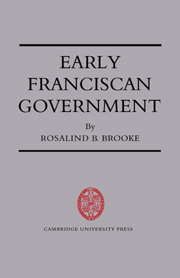VIII - Haymo of Faversham
Published online by Cambridge University Press: 21 January 2010
Summary
ALBERT'S death decided Gregory IX to intervene once more in the constitutional affairs of the Order. The next General Chapter was apparently not due to meet before Whitsun 1241, but the Pope felt that it would be unwise to allow the Minors to remain so long without a leader. He instructed the electors to meet in Rome on 1 November 1240 and here, in his presence, they chose as their new Minister brother Haymo of Faversham. His appointment seems to have been due, in part at any rate, to a desire to secure a certain continuity of policy. Haymo, wrote Eccleston, was most diligent in pressing forward what Albert had begun. The two men had much in common, and indeed tended to be associated together in men's minds and considered as alternative candidates. In 1236 Agnellus of Pisa on his deathbed had advised the English brethren to send Hugh of Wells to Elias, the Minister General, to request that it might please him to assign them as Provincial Albert of Pisa, or Haymo, or Ralph of Rheims. Both Albert and Haymo were priests and noted preachers; both were active opponents of Elias' misgovernment. Haymo was an Englishman, and Albert praised the English for their zeal for the Order. Haymo followed him as Provincial of England and as General. But it is seldom that two able men when given the opportunity will follow an identical policy, even though they belong to the same ‘party’–in this case Elias' adversaries. For all their shared labours, and although others bracketed them as administrators, as individuals they differed markedly. Albert was not so much replaced as superseded.
- Type
- Chapter
- Information
- Early Franciscan GovernmentEllias to Bonaventure, pp. 195 - 209Publisher: Cambridge University PressPrint publication year: 1959



